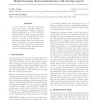Free Online Productivity Tools
i2Speak
i2Symbol
i2OCR
iTex2Img
iWeb2Print
iWeb2Shot
i2Type
iPdf2Split
iPdf2Merge
i2Bopomofo
i2Arabic
i2Style
i2Image
i2PDF
iLatex2Rtf
Sci2ools
95
Voted
ICML
2005
IEEE
2005
IEEE
Hedged learning: regret-minimization with learning experts
In non-cooperative multi-agent situations, there cannot exist a globally optimal, yet opponent-independent learning algorithm. Regret-minimization over a set of strategies optimized for potential opponent models is proposed as a good framework for deciding how to behave in such situations. Using longer playing horizons and experts that learn as they play, the regret-minimization framework can be extended to overcome several shortcomings of earlier approaches to the problem of multi-agent learning.
ICML 2005 | Machine Learning | Multi-agent Learning | Non-cooperative Multi-agent Situations | Potential Opponent Models |
| Added | 17 Nov 2009 |
| Updated | 17 Nov 2009 |
| Type | Conference |
| Year | 2005 |
| Where | ICML |
| Authors | Yu-Han Chang, Leslie Pack Kaelbling |
Comments (0)

